ASROCK 4Core1600Twins-P35 User Manual [fr]

Copyright Notice:
No part of this installation guide may be reproduced, transcribed, transmitted, or translated in any language, in any form or by any means, except duplication of documentation by the purchaser for backup purpose, without written consent of ASRock Inc.
Products and corporate names appearing in this guide may or may not be registered trademarks or copyrights of their respective companies, and are used only for identification or explanation and to the owners’ benefit, without intent to infringe.
Disclaimer:
Specifications and information contained in this guide are furnished for informational use only and subject to change without notice, and should not be constructed as a commitment by ASRock. ASRock assumes no responsibility for any errors or omissions that may appear in this guide.
With respect to the contents of this guide, ASRock does not provide warranty of any kind, either expressed or implied, including but not limited to the implied warranties or conditions of merchantability or fitness for a particular purpose. In no event shall ASRock, its directors, officers, employees, or agents be liable for any indirect, special, incidental, or consequential damages (including damages for loss of profits, loss of business, loss of data, interruption of business and the like), even if ASRock has been advised of the possibility of such damages arising from any defect or error in the guide or product.
This device complies with Part 15 of the FCC Rules. Operation is subject to the following two conditions:
(1)this device may not cause harmful interference, and
(2)this device must accept any interference received, including interference that may cause undesired operation.
CALIFORNIA, USA ONLY
The Lithium battery adopted on this motherboard contains Perchlorate, a toxic substance controlled in Perchlorate Best Management Practices (BMP) regulations passed by the California Legislature. When you discard the Lithium battery in California, USA, please follow the related regulations in advance.
“Perchlorate Material-special handling may apply, see www.dtsc.ca.gov/hazardouswaste/perchlorate”
ASRock Website: http://www.asrock.com
Published January 2008
Copyright©2008 ASRock INC. All rights reserved.
1
English
ASRock 4Core1600Twins-P35 Motherboard
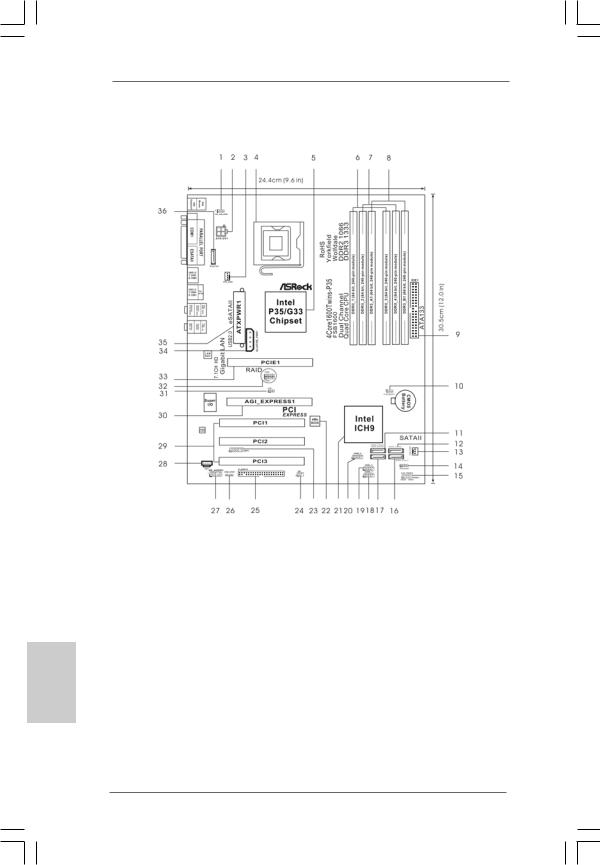
Motherboard Layout
English
2
1 |
PS2_USB_PWR1 Jumper |
18 |
USB 2.0 Header (USB6_7, Blue) |
2 |
ATX 12V Connector (ATX12V1) |
19 |
USB 2.0 Header (USB4_5, Blue) |
3 |
CPU Fan Connector (CPU_FAN1) |
20 |
USB 2.0 Header (USB8_9, Blue) |
4 |
775-Pin CPU Socket |
21 |
South Bridge Controller |
5 |
North Bridge Controller |
22 |
SPI BIOS Chip |
6 |
2 x 240-pin DDR2 DIMM Slots |
23 |
WiFi Header (WiFi) |
|
(Dual Channel A: DDRII_1, DDRII_3; Yellow) |
24 |
DeskExpress Hot Plug Detection Header |
7 |
2 x 240-pin DDR2 DIMM Slots |
|
(IR1) |
|
(Dual Channel B: DDRII_2, DDRII_4; Orange) |
25 |
Floppy Connector (FLOPPY1) |
8 |
2 x 240-pin DDR3 DIMM Slots |
26 |
HDMI_SPDIF Header (HDMI_SPDIF1) |
|
(Dual Channel C: DDR3_A1, DDR3_B1; Green) |
27 |
Front Panel Audio Header (HD_AUDIO1) |
9 |
IDE1 Connector (IDE1, Blue) |
28 |
Internal Audio Connector: CD1 (Black) |
10 |
Clear CMOS Jumper (CLRCMOS1) |
29 |
PCI Slots (PCI1 - 3) |
11 |
SATAII Connector (SATAII_5 (Port4), Red) |
30 |
AGI Express Slot (AGI_EXPRESS1) |
12 |
SATAII Connector (SATAII_1 (Port0), Red) |
31 |
FSB1 Jumper |
13 |
Chassis Fan Connector (CHA_FAN1) |
32 |
FSB2 / FSB3 Jumpers |
14 |
Chassis Speaker Header (SPEAKER 1) |
33 |
PCI Express x16 Slot (PCIE1) |
15 |
System Panel Header (PANEL1) |
34 |
SLI / XFIRE Power Connector |
16 |
SATAII Connector (SATAII_2 (Port1), Red) |
35 |
ATX Power Connector (ATXPWR1) |
17 |
SATAII Connector (SATAII_6 (Port5), Orange) |
36 |
eSATAII Connector (eSATAII) |
ASRock 4Core1600Twins-P35 Motherboard
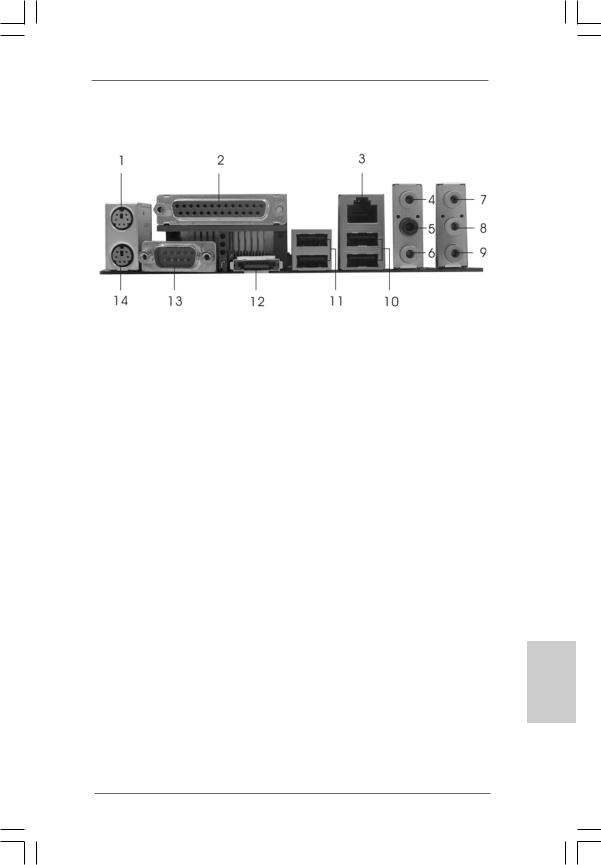
ASRock 8CH_eSATAII I/O Plus
1 |
PS/2 |
Mouse Port (Green) |
* 8 |
Front Speaker |
(Lime) |
||
2 |
Parallel Port |
|
9 |
Microphone (Pink) |
|||
3 |
RJ-45 |
Port |
|
10 |
USB 2.0 |
Ports |
(USB01) |
4 |
Side |
Speaker |
(Gray) |
11 |
USB 2.0 |
Ports |
(USB23) |
5 |
Rear |
Speaker |
(Black) |
12 |
eSATAII Port |
|
|
6 |
Central / Bass |
(Orange) |
13 |
COM Port |
|
||
7 |
Line In (Light Blue) |
14 |
PS/2 Keyboard |
Port (Purple) |
|||
*If you use 2-channel speaker, please connect the speaker’s plug into “Front Speaker Jack”. See the table below for connection details in accordance with the type of speaker you use.
TABLE for Audio Output Connection
Audio Output Channels |
Front Speaker |
Rear Speaker |
Central / Bass |
Side Speaker |
|
(No. 8) |
(No. 5) |
(No. 6) |
(No. 4) |
2 |
V |
-- |
-- |
-- |
4 |
V |
V |
-- |
-- |
6 |
V |
V |
V |
-- |
8 |
V |
V |
V |
V |
*To enable Multi-Streaming function, you need to connect a front panel audio cable to the front
panel audio header. After restarting your computer, you will find “Mixer” tool on your system. Please select “Mixer ToolBox”  , click “Enable playback multi-streaming”, and click “ok”. Choose “2CH”, “4CH”, “6CH”, or “8CH” and then you are allowed to select “Realtek HDA Primary output” to use Rear Speaker, Central/Bass, and Front Speaker, or select “Realtek HDA Audio 2nd output” to use front panel audio.
, click “Enable playback multi-streaming”, and click “ok”. Choose “2CH”, “4CH”, “6CH”, or “8CH” and then you are allowed to select “Realtek HDA Primary output” to use Rear Speaker, Central/Bass, and Front Speaker, or select “Realtek HDA Audio 2nd output” to use front panel audio.
English
3
ASRock 4Core1600Twins-P35 Motherboard

1. Introduction
Thank you for purchasing ASRock 4Core1600Twins-P35 motherboard, a reliable motherboard produced under ASRock’s consistently stringent quality control. It delivers excellent performance with robust design conforming to ASRock’s commitment to quality and endurance.
This Quick Installation Guide contains introduction of the motherboard and step-by- step installation guide. More detailed information of the motherboard can be found in the user manual presented in the Support CD.
Because the motherboard specifications and the BIOS software might be updated, the content of this manual will be subject to change without notice. In case any modifications of this manual occur, the updated version will be available on ASRock website without further notice. You may find the latest VGA cards and CPU support lists on ASRock website as well. ASRock website http://www.asrock.com
If you require technical support related to this motherboard, please visit our website for specific information about the model you are using. www.asrock.com/support/index.asp
1.1 Package Contents
ASRock 4Core1600Twins-P35 Motherboard
(ATX Form Factor: 12.0-in x 9.6-in, 30.5 cm x 24.4 cm) ASRock 4Core1600Twins-P35 Quick Installation Guide ASRock 4Core1600Twins-P35 Support CD
One 80-conductor Ultra ATA 66/100/133 IDE Ribbon Cable One Ribbon Cable for a 3.5-in Floppy Drive
Two Serial ATA (SATA) Data Cables (Optional)
One Serial ATA (SATA) HDD Power Cable (Optional) One HDMI_SPDIF Cable (Optional)
One “ASRock 8CH_eSATAII I/O Plus” I/O Panel Shield
hsilgnE
4
ASRock 4Core1600Twins-P35 Motherboard

1.2 Specifications
Platform |
- ATX Form Factor: 12.0-in x 9.6-in, 30.5 cm x 24.4 cm |
CPU |
- LGA 775 for Intel® CoreTM 2 Extreme / CoreTM 2 Quad / CoreTM |
|
2 Duo / Pentium® Dual Core / Celeron®, supporting Penryn Quad |
|
Core Yorkfield and Dual Core Wolfdale processors |
|
- Compatible with all FSB1600/1333/1066/800MHz CPUs |
|
(see CAUTION 1) |
|
- Supports Hyper-Threading Technology (see CAUTION 2) |
|
- Supports Untied Overclocking Technology (see CAUTION 3) |
|
- Supports EM64T CPU |
Chipset |
- Northbridge: Intel® P35/G33 |
|
- Southbridge: Intel® ICH9 |
Memory |
- Dual Channel DDR3/DDR2 Memory Technology |
|
(see CAUTION 4) |
|
- 2 x DDR3 DIMM slots (green) |
|
- Support DDR3 1333/1066/800 non-ECC, un-buffered memory |
|
(see CAUTION 5) |
|
- Max. capacity: 4GB (see CAUTION 6) |
|
- 4 x DDR2 DIMM slots (yellow and orange) |
|
- Support DDR2 1066/800/667 non-ECC, un-buffered memory |
|
(see CAUTION 5) |
|
- Max. capacity: 8GB (see CAUTION 6) |
Expansion Slot |
- Supports ATITM CrossFireTM |
|
- 1 x PCI Express x16 slot |
|
- 1 x AGI Express slot (PCI Express x4) |
|
- 3 x PCI slots |
Audio |
- 7.1 CH Windows® VistaTM Premium Level HD Audio |
|
(ALC888 Audio Codec) |
LAN |
- PCIE x1 Gigabit LAN 10/100/1000 Mb/s |
|
- Realtek RTL8111B/RTL8111C |
|
- Supports Wake-On-LAN |
Rear Panel I/O |
ASRock 8CH_eSATAII I/O Plus |
|
- 1 x PS/2 Mouse Port |
|
- 1 x PS/2 Keyboard Port |
|
- 1 x Serial Port: COM1 |
|
- 1 x Parallel Port (ECP/EPP Support) |
|
- 4 x Ready-to-Use USB 2.0 Ports |
|
- 1 x eSATAII Port |
|
- 1 x RJ-45 LAN Port |
English
5
ASRock 4Core1600Twins-P35 Motherboard

|
|
|
- HDAudio Jack: Side Speaker/Rear Speaker/Central/Bass/ |
|
|
|
|
Line in/Front Speaker/Microphone (see CAUTION 7) |
|
|
|
Connector |
- 4 x SATAII 3.0Gb/s connectors, support NCQ, AHCI and |
|
|
|
|
“Hot Plug” functions (see CAUTION 8) |
|
|
|
|
- 1 x eSATAII 3.0Gb/s connector (shared with 1 SATAII |
|
|
|
|
connector) (see CAUTION 9) |
|
|
|
|
- 1 x ATA133 IDE connector (supports 2 x IDE devices) |
|
|
|
|
- 1 x Floppy connector |
|
|
|
|
- 1 x DeskExpress Hot Plug Detection header |
|
|
|
|
- 1 x HDMI_SPDIF header |
|
|
|
|
- CPU/Chassis FAN connector |
|
|
|
|
- 24 pin ATX power connector |
|
|
|
|
- 4 pin 12V power connector |
|
|
|
|
- SLI/XFIRE power connector |
|
|
|
|
- CD in header |
|
|
|
|
- Front panel audio connector |
|
|
|
|
- 3 x USB 2.0 headers (support 6 USB 2.0 ports) |
|
|
|
|
(see CAUTION 10) |
|
|
|
|
- 1 x WiFi header (see CAUTION 11) |
|
|
|
BIOS Feature |
- 4Mb AMI BIOS |
|
|
|
|
- AMI Legal BIOS |
|
|
|
|
- Supports “Plug and Play” |
|
|
|
|
- ACPI 1.1 Compliance Wake Up Events |
|
|
|
|
- Supports jumperfree |
|
|
|
|
- AMBIOS 2.3.1 Support |
|
|
|
|
- CPU, DRAM, NB, SB, VTT Voltage Multi-adjustment |
|
|
|
|
- Supports I. O. T. (Intelligent Overclocking Technology) |
|
|
|
Support CD |
- Drivers, Utilities, AntiVirus Software (Trial Version) |
|
|
|
Unique Feature |
- ASRock OC Tuner (see CAUTION 12) |
|
|
|
|
- Hybrid Booster: |
|
|
|
|
- CPU Frequency Stepless Control (see CAUTION 13) |
|
|
|
|
- ASRock U-COP (see CAUTION 14) |
|
|
|
|
- Boot Failure Guard (B.F.G.) |
|
|
|
Hardware |
- CPU Temperature Sensing |
|
E |
||||
|
Monitor |
- Chassis Temperature Sensing |
||
lgn |
|
|||
|
|
- CPU Fan Tachometer |
||
si |
|
|
- Chassis Fan Tachometer |
|
h |
|
|
||
|
|
- CPU Quiet Fan |
||
|
|
|
||
|
|
|
- Voltage Monitoring: +12V, +5V, +3.3V, CPU Vcore |
|
|
|
|
||
|
|
OS |
- Microsoft® Windows® 2000 / XP / XP 64-bit / VistaTM / |
|
|
|
|
VistaTM 64-bit compliant (see CAUTION 15) |
|
|
|
Certifications |
- FCC, CE, WHQL |
* For detailed product information, please visit our website: http://www.asrock.com
6
ASRock 4Core1600Twins-P35 Motherboard

WARNING
Please realize that there is a certain risk involved with overclocking, including adjusting the setting in the BIOS, applying Untied Overclocking Technology, or using the third-party overclocking tools. Overclocking may affect your system stability, or even cause damage to the components and devices of your system. It should be done at your own risk and expense. We are not responsible for possible damage caused by overclocking.
CAUTION!
1.FSB1600-CPU will operate in overclocking mode. If you use a FSB1600CPU on this motherboard, you need to adjust the jumpers. Please refer to page 21 for proper jumper settings. Besides, if you want to change a new CPU on this motherboard, please remove the AC power cord from your PC in advance.
2.About the setting of “Hyper Threading Technology”, please check page 47 of “User Manual” in the support CD.
3.This motherboard supports Untied Overclocking Technology. Please read “Untied Overclocking Technology” on page 35 for details.
4.This motherboard supports Dual Channel Memory Technology. Before you implement Dual Channel Memory Technology, make sure to read the installation guide of memory modules on page 12 for proper installation.
5.Please check the table below for the CPU FSB frequency and its corresponding memory support frequency.
CPU FSB Frequency |
Memory Support Frequency |
|
1600 |
DDR2 800, DDR2 1066, |
|
|
DDR3 1066, DDR3 1333 |
|
1333 |
DDR2 667, DDR2 800, DDR2 1066, |
|
|
DDR3 800, DDR3 1066, DDR3 1333 |
|
1066 |
DDR2 667, DDR2 800, DDR2 1066, |
|
|
DDR3 800, DDR3 1066 |
|
800DDR2 667, DDR2 800, DDR3 800
*DDR2 1066 and DDR3 1333 memory modules will operate in overclocking mode.
*When you use a FSB1600-CPU on this motherboard, it will run at DDR2 960 if you adopt a DDR2 1066 memory module. When you use a FSB1600-CPU on this motherboard, it will run at DDR3 960 if you adopt a DDR3 1066 memory module. When you use a FSB1600-CPU on this motherboard, it will run at DDR3 1280 if you adopt a DDR3 1333 memory module.
*If you adopt a DDR2 1066 memory module and adopt a FSB1333CPU or FSB1066-CPU on this motherboard, you need to adjust the jumpers. Please refer to page 21 for proper jumper settings.
6.Due to the operating system limitation, the actual memory size may be less than 4GB for the reservation for system usage under Windows® XP and Windows® VistaTM. For Windows® XP 64-bit and Windows® VistaTM 64-bit with 64-bit CPU, there is no such limitation.
7
English
ASRock 4Core1600Twins-P35 Motherboard

hsilgnE
7.For microphone input, this motherboard supports both stereo and mono modes. For audio output, this motherboard supports 2-channel, 4- channel, 6-channel, and 8-channel modes. Please check the table on page 3 for proper connection.
8.Before installing SATAII hard disk to SATAII connector, please read the “SATAII Hard Disk Setup Guide” on page 31 to adjust your SATAII hard disk drive to SATAII mode. You can also connect SATA hard disk to SATAII connector directly.
9.This motherboard supports eSATAII interface, the external SATAII specification. Please read “eSATAII Interface Introduction” on page 28 for details about eSATAII and eSATAII installation procedures.
10.Power Management for USB 2.0 works fine under Microsoft® Windows® VistaTM 64-bit / VistaTM / XP 64-bit / XP SP1 or SP2 / 2000 SP4.
11.WiFi header supports WiFi+AP function with ASRock WiFi-802.11g or WiFi-802.11n module, an easy-to-use wireless local area network (WLAN) adapter. It allows you to create a wireless environment and enjoy the convenience of wireless network connectivity. Please visit our website for the availability of ASRock WiFi-802.11g or WiFi-802.11n
module. ASRock website http://www.asrock.com
12.It is a user-friendly ASRock overclocking tool which allows you to surveil your system by hardware monitor function and overclock your hardware devices to get the best system performance under Windows® environment. Please visit our website for the operation procedures of ASRock OC Tuner. ASRock website: http://www.asrock.com
13.Although this motherboard offers stepless control, it is not recommended to perform over-clocking. Frequencies other than the recommended CPU bus frequencies may cause the instability of the system or damage the CPU.
14.While CPU overheat is detected, the system will automatically shutdown. Before you resume the system, please check if the CPU fan on the motherboard functions properly and unplug the power cord, then plug it back again. To improve heat dissipation, remember to spray thermal grease between the CPU and the heatsink when you install the PC system.
15.AHCI function is not supported under Windows® 2000 OS. It is recommended to use IDE mode under Windows® 2000. Please refer to page 51 of “User Manual” in the support CD for detailed setup.
1.3 Minimum Hardware Requirement Table for Windows® VistaTM Premium 2008 and Basic Logo
For system integrators and users who purchase this motherboard and plan to submit Windows® VistaTM Premium 2008 and Basic logo, please follow below table for minimum hardware requirements.
8
ASRock 4Core1600Twins-P35 Motherboard

CPU |
Celeron 420 |
Memory |
1GB system memory (Premium) |
|
512MB Single Channel (Basic) |
|
|
VGA |
DX10 with WDDM Driver |
|
|
|
with 128bit VGA memory (Premium) |
|
with 64bit VGA memory (Basic) |
*After June 1, 2008, all Windows® VistaTM systems are required to meet above minimum hardware requirements in order to qualify for Windows® VistaTM Premium 2008 logo.
2.Installation
Pre-installation Precautions
Take note of the following precautions before you install motherboard components or change any motherboard settings.
1.Unplug the power cord from the wall socket before touching any component. Failure to do so may cause severe damage to the motherboard, peripherals, and/or components.
2.To avoid damaging the motherboard components due to static electricity, NEVER place your motherboard directly on the carpet or the like. Also remember to use a grounded wrist strap or touch a safety grounded object before you handle components.
3.Hold components by the edges and do not touch the ICs.
4.Whenever you uninstall any component, place it on a grounded antstatic pad or in the bag that comes with the component.
5.When placing screws into the screw holes to secure the motherboard to the chassis, please do not over-tighten the screws! Doing so may damage the motherboard.
2.1 CPU Installation
For the installation of Intel 775-LAND CPU, please follow the steps below.
English
775-Pin Socket Overview
Before you insert the 775-LAND CPU into the socket, please check if the CPU surface is unclean or if there is any bent pin on the socket. Do not force to insert the CPU into the socket if above situation is found. Otherwise, the CPU will be seriously damaged.
9
ASRock 4Core1600Twins-P35 Motherboard

Step 1. Open the socket:
Step 1-1. Disengaging the lever by depressing down and out on the hook to clear retention tab.
hsilgnE
Step 1-2. Rotate the load lever to fully open position at approximately 135 degrees.
Step 1-3. Rotate the load plate to fully open position at approximately 100 degrees.
Step 2. Insert the 775-LAND CPU:
Step 2-1. Hold the CPU by the edges where are marked with black lines.
Step 2-2. Orient the CPU with IHS (Integrated Heat Sink) up. Locate Pin1 and the two orientation key notches.
lineblack |
lineblack |
Pin1 |
|
Pin1 |
|
|
|
alignment key |
|
orientation |
orientation |
alignment key |
|
|
|
||
key notch |
key notch |
|
|
|
|
|
775-Pin Socket |
|
775-LAND CPU |
|
|
For proper inserting, please ensure to match the two orientation key notches of the CPU with the two alignment keys of the socket.
Step 2-3. Carefully place the CPU into the socket by using a purely vertical motion.
Step 2-4. Verify that the CPU is within the socket and properly mated to the orient keys.
Step 3. Remove PnP Cap (Pick and Place Cap):
Use your left hand index finger and thumb to support the load plate edge, engage PnP cap with right hand thumb and peel the cap from the socket while pressing on center of PnP cap to assist in removal.
1 0
ASRock 4Core1600Twins-P35 Motherboard
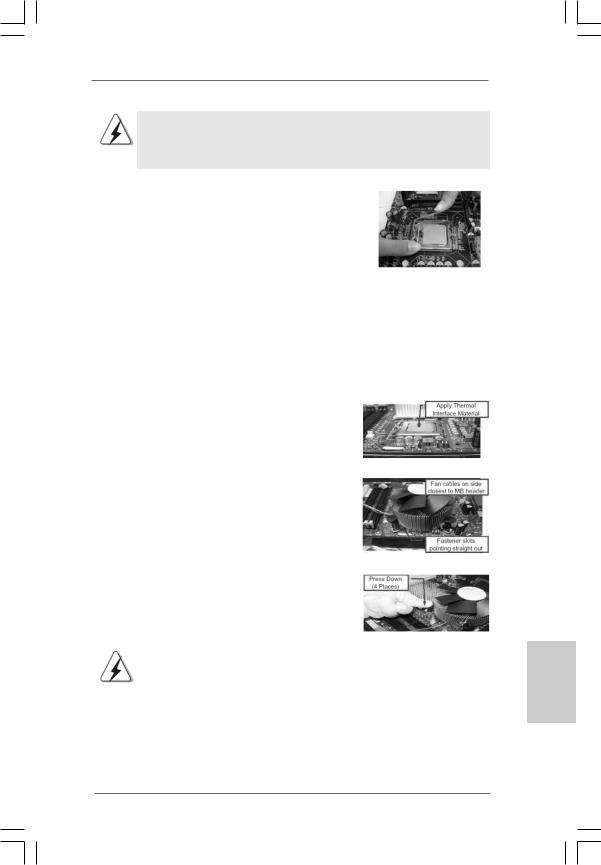
1.It is recommended to use the cap tab to handle and avoid kicking off the PnP cap.
2.This cap must be placed if returning the motherboard for after service.
Step 4. Close the socket:
Step 4-1. Rotate the load plate onto the IHS. Step 4-2. While pressing down lightly on load
plate, engage the load lever.
Step 4-3. Secure load lever with load plate tab under retention tab of load lever.
2.2Installation of CPU Fan and Heatsink
For proper installation, please kindly refer to the instruction manuals of your CPU fan and heatsink.
Below is an example to illustrate the installation of the heatsink for 775-LAND CPU. Step 1. Apply thermal interface material onto center
of IHS on the socket surface.
Step 2. |
Place the heatsink onto the socket. Ensure |
|
fan cables are oriented on side closest to the |
|
CPU fan connector on the motherboard |
|
(CPU_FAN1, see page 2, No. 3). |
Step 3. |
Align fasteners with the motherboard |
|
throughholes. |
Step 4. |
Rotate the fastener clockwise, then press |
|
down on fastener caps with thumb to install |
|
and lock. Repeat with remaining fasteners. |
|
|
|
If you press down the fasteners without rotating them clockwise, |
|
the heatsink cannot be secured on the motherboard. |
|
|
Step 5. |
Connect fan header with the CPU fan |
|
connector on the motherboard. |
Step 6. |
Secure excess cable with tie-wrap to ensure |
|
cable does not interfere with fan operation or |
|
contact other components. |
1 1
English
ASRock 4Core1600Twins-P35 Motherboard

2.3 Installation of Memory Modules (DIMM)
This motherboard provides four 240-pin DDR2 (Double Data Rate 2) DIMM slots and two 240-pin DDR3 (Double Data Rate 3) DIMM slots, and supports Dual Channel Memory Technology. For dual channel configuration, you always need to install identical (the same brand, speed, size and chip-type) DDR2/DDR3 DIMM pair in the slots of the same color. In other words, you have to install identical DDR2 DIMM pair in Dual Channel A (DDRII_1 and DDRII_3; Yellow slots; see p.2 No.6), identical DDR2 DIMM pair in Dual Channel B (DDRII_2 and DDRII_4; Orange slots; see p.2 No.7), or identical DDR3 DIMM pair in Dual Channel C (DDR3_A1 and DDR3_B1; Green slots; see p.2 No.8), so that Dual Channel Memory Technology can be activated. This motherboard also allows you to install four DDR2 DIMMs for dual channel configuration, and please install identical DDR2 DIMMs in all four slots. You may refer to the Dual Channel Memory Configuration Table below.
Dual Channel DDR2 Memory Configurations
(DS: Double Side, SS: Single Side)
|
|
DDRII_1 |
|
DDRII_2 |
DDRII_3 |
|
DDRII_4 |
|
|
(Yellow Slot) |
|
(Orange Slot) |
(Yellow Slot) |
(Orange Slot) |
|
|
|
|
|
|
|
|
|
2 memory modules |
SS |
|
X |
SS |
X |
||
2 memory modules |
DS |
|
X |
DS |
X |
||
2 memory modules |
X |
|
SS |
X |
SS |
||
2 memory modules |
X |
|
DS |
X |
DS |
||
4 memory modules |
SS |
|
SS |
SS |
SS |
||
4 memory modules |
DS |
DS |
DS |
DS |
|||
|
Dual Channel DDR3 Memory Configurations |
|
|
||||
|
(DS: Double Side, SS: Single Side) |
|
|
||||
|
|
|
|
|
|
|
|
|
|
|
|
DDR3_A1 |
DDR3_B1 |
|
|
|
|
|
|
(Green Slot) |
(Green Slot) |
|
|
|
|
|
|
|
|
|
|
|
2 memory modules |
SS |
SS |
|
|
||
|
2 memory modules |
DS |
DS |
|
|
||
hsilgnE
1 2
ASRock 4Core1600Twins-P35 Motherboard

1.If you want to install two memory modules, for optimal compatibility and reliability, it is recommended to install them in the slots of the same color. In other words, install them in the set of green slots (DDR3_A1 and DDR3_B1), in the set of yellow slots (DDRII_1 and DDRII_3), or in the set of orange slots (DDRII_2 and DDRII_4).
2.If only one memory module or three memory modules are installed in the DDR2 DIMM slots on this motherboard, it is unable to activate the Dual Channel Memory Technology. If only one memory module is installed in the DDR3 DIMM slots on this motherboard, it is unable to activate the Dual Channel Memory Technology.
3.If a pair of memory modules is NOT installed in the same Dual Channel, for example, installing a pair of memory modules in DDRII_1 and DDRII_2, it is unable to activate the Dual Channel Memory Technology .
4.It is not allowed to install a DDR3 memory module into DDR2 slot or install a DDR2 memory module into DDR3 slot; otherwise, this motherboard and DIMM may be damaged.
5.DDR2 and DDR3 memory modules cannot be installed on this motherboard at the same time.
English
1 3
ASRock 4Core1600Twins-P35 Motherboard
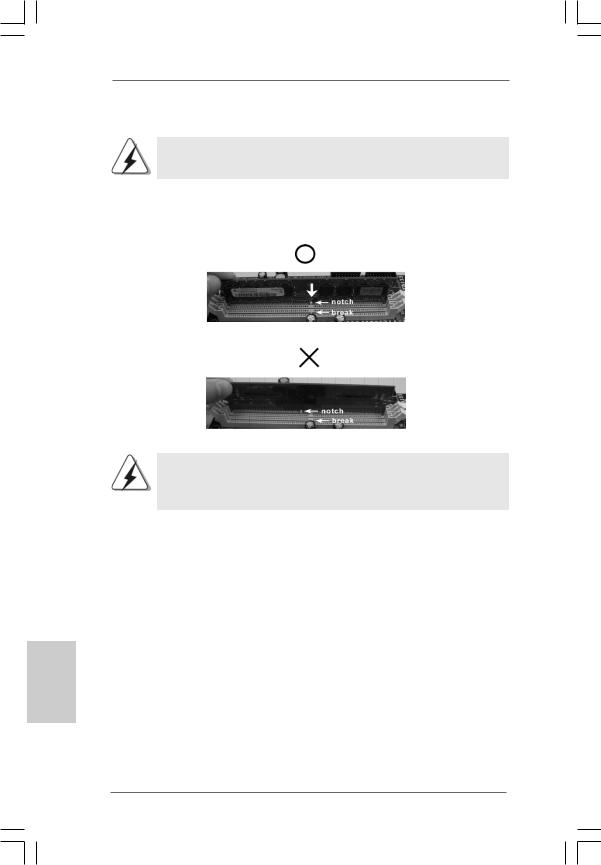
Installing a DIMM
Please make sure to disconnect power supply before adding or removing DIMMs or the system components.
Step 1. Unlock a DIMM slot by pressing the retaining clips outward.
Step 2. Align a DIMM on the slot such that the notch on the DIMM matches the break on the slot.
The DIMM only fits in one correct orientation. It will cause permanent damage to the motherboard and the DIMM if you force the DIMM into the slot at incorrect orientation.
Step 3. Firmly insert the DIMM into the slot until the retaining clips at both ends fully snap back in place and the DIMM is properly seated.
hsilgnE
1 4
ASRock 4Core1600Twins-P35 Motherboard

2.4 Expansion Slots (PCI, PCI Express, and AGI Express Slots)
There are 3 PCI slots, 1 PCI Express slot, and 1 AGI Express slot (PCI Express x4) on this motherboard.
PCI slots: PCI slots are used to install expansion cards that have the 32-bit PCI interface.
PCIE slots: PCIE1 (PCIE x16 slot) is used for PCI Express cards with x16 lane width graphics cards.
AGI Express slot (PCI Express x4):
AGI Express slot (PCI Express x4) is used to install PCI Express expansion cards.
If you plan to install only one PCI Express card on this motherboard, please install it on PCIE1 (PCIE x16 slot).
Installing an expansion card
Step 1. Before installing the expansion card, please make sure that the power supply is switched off or the power cord is unplugged. Please read the documentation of the expansion card and make necessary hardware
settings for the card before you start the installation.
Step 2. Remove the bracket facing the slot that you intend to use. Keep the screws for later use.
Step 3. Align the card connector with the slot and press firmly until the card is completely seated on the slot.
Step 4. Fasten the card to the chassis with screws.
2.5 CrossFireTM Operation Guide
This motherboard supports CrossFireTM feature. CrossFireTM technology offers the most advantageous means available of combining multiple high performance Graphics Processing Units (GPU) in a single PC. Combining a range of different operating modes with intelligent software design and an innovative interconnect mechanism, CrossFireTM enables the highest possible level of performance and image quality in any 3D application. Currently CrossFireTM feature is supported with Windows® XP with Service Pack 2 and VistaTM OS. Please check AMD website for ATITM CrossFireTM driver updates.
1 5
English
ASRock 4Core1600Twins-P35 Motherboard

hsilgnE
What graphics cards work with CrossFireTM?
A complete CrossFireTM system requires a CrossFireTM Ready motherboard, a CrossFireTM Edition graphics card and a compatible standard Radeon (CrossFireTM Ready) graphics card from the same series, or two CrossFireTM Ready cards. This applies to cards from ATITM or any of its partners. Please refer to below table for CrossFireTM VGA card support list according to the OS you install.
For Windows® XP
Vendor |
Chipset |
Model |
Driver |
|
ATI |
Radeon HD2900XT |
MSI RX2900XT-VT2D512E |
Catalyst 7.11 |
|
|
Radeon HD 2600XT |
Gigabyte GV-RX26T256HP-B |
Catalyst 7.9 |
|
|
Radeon HD 2600PRO |
MSI RX2600PRO-T2D256EZ |
Catalyst 7.9 |
|
|
Radeon X1950XTX |
GeCube RX1950XTX |
Catalyst 7.11 |
|
|
Radeon X1950PRO |
Gecube Radeon X1950Pro 256MB |
Catalyst 7.11 |
|
For Windows® Vista |
|
|
|
|
Vendor |
Chipset |
Model |
Driver |
|
ATI |
Radeon HD2900XT |
MSI RX2900XT-VT2D512E |
Catalyst 7.11 |
|
|
Radeon HD 2600XT |
Gigabyte GV-RX26T256HP-B |
Catalyst 7.9 |
|
|
Radeon HD 2600PRO |
MSI RX2600PRO-T2D256EZ |
Catalyst 7.9 |
|
|
Radeon X1950XTX |
GeCube RX1950XTX |
Catalyst 7.11 |
|
|
Radeon X1950PRO |
Gecube Radeon X1950Pro 256MB |
Catalyst 7.11 |
|
|
Radeon X1600PRO |
MSI RX1600PRO-TD256E |
Catalyst 7.3 |
|
|
Radeon X1300 PRO |
MSI RX1300PRO-TD256E |
Catalyst 7.3 |
|
1.If a customer incorrectly configures their system they will not see the performance benefits of CrossFireTM. All three CrossFireTM components, a CrossFireTM Ready graphics card, a CrossFireTM Ready motherboard and a CrossFireTM Edition co-processor graphics card, must be installed correctly to benefit from the CrossFireTM multi-GPU platform.
2.If you pair a 12-pipe CrossFireTM Edition card with a 16-pipe card, both cards will operate as 12-pipe cards while in CrossFireTM mode.
Enjoy the benefit of CrossFireTM
Different CrossFireTM cards may require different methods to enable CrossFireTM feature. In below procedures, we use Radeon 2600XT as the example graphics card. For other CrossFireTM cards that ATITM has released or will release in the future, please refer to ATITM graphics card manuals for detailed installation guide.
Step 1. Connect to the system power supply. Please connect a hard disk power connector to SLI/XFIRE Power connector on this motherboard.
It is recommended to use 500-Watt power supply or greater to perform the benefit of CrossFireTM feature.
1 6
ASRock 4Core1600Twins-P35 Motherboard

Step 2. Install one Radeon graphics card to PCIE1 slot. For the proper installation procedures, please refer to section “Expansion Slots”.
Step 3. Install the other Radeon graphics card to AGI Express slot (PCI
Express x4). For the proper installation procedures, please refer to section “Expansion Slots”.
Step 4. Connect two Radeon graphics cards by installing two CrossFireTM Bridge on CrossFireTM Bridge Interconnects on the top of Radeon graphics cards. (CrossFireTM Bridge is provided with the graphics card you purchase, not bundled with this motherboard. Please refer to your graphics card vendor for details.)
CrossFireTM Bridge
Step 5. Connect the DVI monitor cable to the DVI connector on the Radeon graphics card on PCIE1 slot. (You may use the DVI to D-Sub adapter to convert the DVI connector to D-Sub interface, and then connect the D-Sub monitor cable to the
DVI to D-Sub adapter.)
1 7
English
ASRock 4Core1600Twins-P35 Motherboard
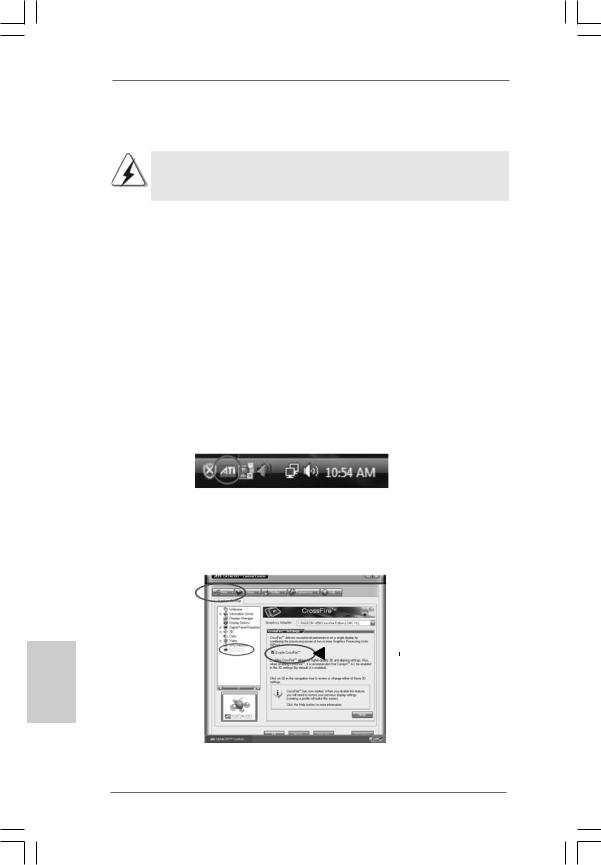
Step 6. Power on your computer and boot into OS.
Step 7. Remove the ATITM driver if you have any VGA driver installed in your system.
The Catalyst Uninstaller is an optional download. We recommend using this utility to uninstall any previously installed Catalyst drivers prior to installation. Please check AMD website for ATITM driver updates.
Step 8. Install the required drivers to your system.
For Windows® XP OS:
A.ATITM recommends Windows® XP Service Pack 2 or higher to be installed (If you have Windows® XP Service Pack 2 or higher installed in your system, there is no need to download it again): http://www.microsoft.com/windowsxp/sp2/default.mspx
B.You must have Microsoft .NET Framework installed prior to downloading and installing the CATALYST Control Center. Please
check Microsoft website for details.
For Windows® VistaTM OS:
Install the CATALYST Control Center. Please check AMD website for details.
Step 9. Restart your computer.
Step 10. Install the VGA card drivers to your system, and restart your computer. Then you will find “ATI Catalyst Control Center” on your Windows® taskbar.
hsilgnE
ATI Catalyst Control Center
Step 11. Double-click “ATI Catalyst Control Center”. Click “View”, and select “Advanced View”. Click “CrossFireTM”, and then set the option “Enable CrossFireTM” to “Yes”.
View
CrossFireTM |
|
Enable CrossFireTM |
|
1 8
ASRock 4Core1600Twins-P35 Motherboard

le CrossFireTM
Although you have selected the option “Enable CrossFireTM”, the CrossFireTM function may not work actually. Your computer will automatically reboot. After restarting your computer, please confirm whether the option “Enable CrossFireTM” in “ATI Catalyst Control Center” is selected or not; if not, please select it again, and then you are able to enjoy the benefit of CrossFireTM feature.
Step 12. You can freely enjoy the benefit of CrossFireTM feature.
*CrossFireTM appearing here is a registered trademark of ATITM Technologies Inc., and is used only for identification or explanation and to the owners’ benefit, without intent to infringe.
*For further information of ATITM CrossFireTM technology, please check AMD website for up dates and details.
2.6 Surround Display Feature
This motherboard supports Surround Display upgrade. With the external add-on PCI Express VGA card, you can easily enjoy the benefits of Surround Display feature. For the detailed instruction, please refer to the document at the following path in the Support CD:
..\ Surround Display Information
English
1 9
ASRock 4Core1600Twins-P35 Motherboard
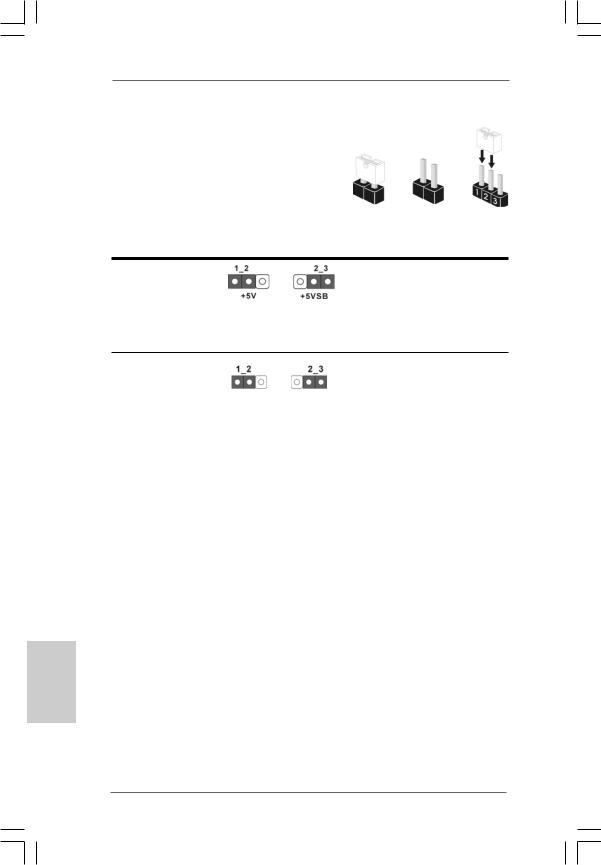
2.7 Jumpers Setup
The illustration shows how jumpers are |
|
|
||
setup. When the jumper cap is placed on |
|
|
||
pins, the jumper is “Short”. If no jumper cap |
|
|
||
is placed on pins, the jumper is “Open”. The |
|
|
||
illustration shows a 3-pin jumper whose pin1 |
Short |
Open |
||
and pin2 are “Short” when jumper cap is |
||||
|
|
|||
placed on these 2 pins. |
|
|
|
|
Jumper |
Setting |
|
Description |
|
Short pin2, pin3 to enable +5VSB (standby) for PS/2 or USB wake up events.
Note: To select +5VSB, it requires 2 Amp and higher standby current provided by power supply.
Clear CMOS Jumper
(CLRCMOS1)
(see p.2 No. 10) |
Default Clear CMOS |
|
Note: CLRCMOS1 allows you to clear the data in CMOS. The data in CMOS includes system setup information such as system password, date, time, and system setup parameters. To clear and reset the system parameters to default setup, please turn off the computer and unplug the power cord from the power supply. After waiting for 15 seconds, use a jumper cap to short pin2 and pin3 on CLRCMOS1 for 5 seconds. However, please do not clear the CMOS right after you update the BIOS. If you need to clear the CMOS when you just finish updating the BIOS, you must boot up the system first, and then shut it down before you do the clearCMOS action.
hsilgnE
2 0
ASRock 4Core1600Twins-P35 Motherboard
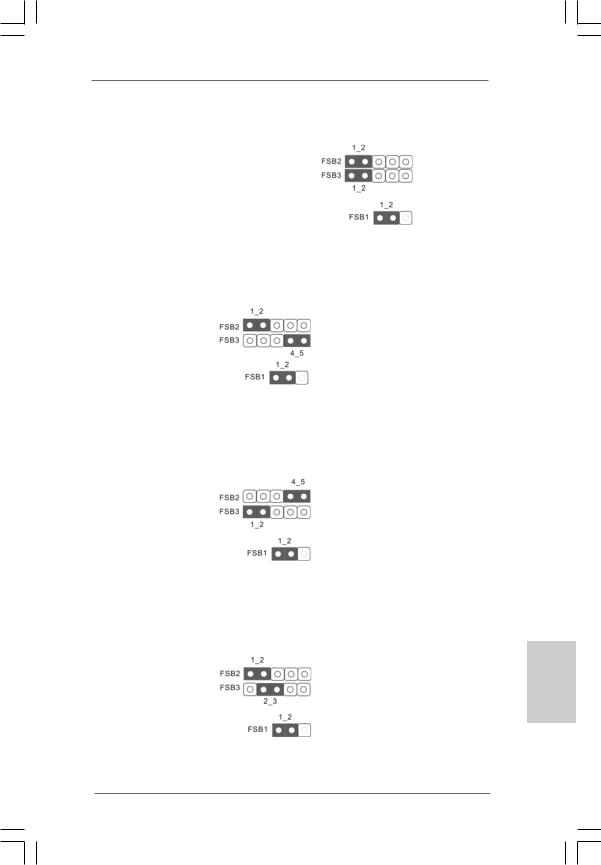
FSB1 Jumper
(FSB1, 3-pin jumper, see p.2 No. 31)
FSB2 Jumper
(FSB2, 5-pin jumper, see p.2 No. 32)
Default
FSB3 Jumper
(FSB3, 5-pin jumper, see p.2 No. 32)
Note1: If you use a FSB1600-CPU on this motherboard, you need to adjust the jumpers. Please short pin4, pin5 for FSB3. Otherwise, the CPU may not work properly on this motherboard. Please refer to below jumper settings.
FSB1600
Note2: If you use a FSB1333-CPU and adopt a DDR2 1066 memory module on this motherboard, you need to adjust the jumpers. Please short pin4, pin5 for FSB2. Otherwise, the CPU and memory module may not work properly on this motherboard. Please refer to below jumper settings.
FSB1333 / DDR2 1066
Note3: If you use a FSB1066-CPU and adopt a DDR2 1066 memory module on this motherboard, you need to adjust the jumpers. Please short pin2, pin3 for FSB3. Otherwise, the CPU and memory module may not work properly on this motherboard. Please refer to below jumper settings.
English
FSB1066 / DDR2 1066
2 1
ASRock 4Core1600Twins-P35 Motherboard
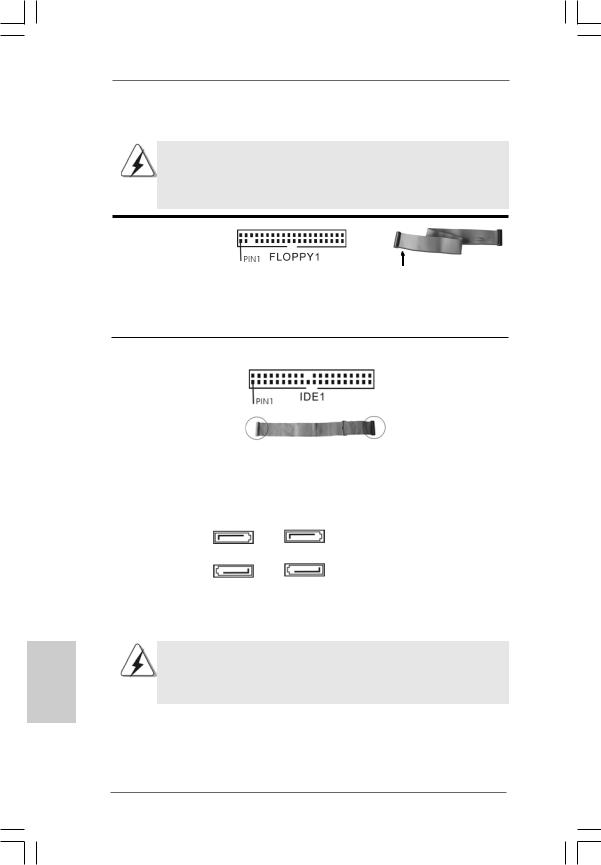
hsilgnE
2.8 Onboard Headers and Connectors
Onboard headers and connectors are NOT jumpers. Do NOT place jumper caps over these headers and connectors. Placing jumper caps over the headers and connectors will cause permanent damage of the motherboard!
FDD connector
(33-pin FLOPPY1)
(see p.2 No. 25)
the red-striped side to Pin1
Note: Make sure the red-striped side of the cable is plugged into Pin1 side of the connector.
Primary IDE connector (Blue)
(39-pin IDE1, see p.2 No. 9)
connect the blue end |
|
connect the black end |
|||
to the motherboard |
|
to the IDE devices |
|||
|
80-conductor ATA 66/100/133 cable |
|
|||
Note: Please refer to the instruction of your IDE device vendor |
for the details. |
||||
|
|
|
|||
Serial ATAII Connectors |
|
These four Serial ATAII (SATAII) |
|||
(SATAII_1 (Port0): |
|
|
connectors support SATA data |
||
see p.2, No. 12) |
SATAII_5 (Port4) |
SATAII_1 (Port0) |
cables for internal storage |
||
(SATAII_2 (Port1): |
devices. The current SATAII |
||||
|
|
||||
see p.2, No. 16) |
|
|
interface allows up to 3.0 Gb/s |
||
(SATAII_5 (Port4): |
SATAII_6 (Port5) |
SATAII_2 (Port1) |
data transfer rate. |
||
see p.2, No. 11) |
|
|
|
|
|
(SATAII_6 (Port5): |
|
|
|
|
|
see p.2, No. 17) |
|
|
|
|
|
SATAII_6 (Port5) connector can be used for internal storage device or be connected to eSATAII connector to support eSATAII device. Please read “eSATAII Interface Introduction” on page 28 for details about eSATAII and eSATAII installation procedures.
2 2
ASRock 4Core1600Twins-P35 Motherboard
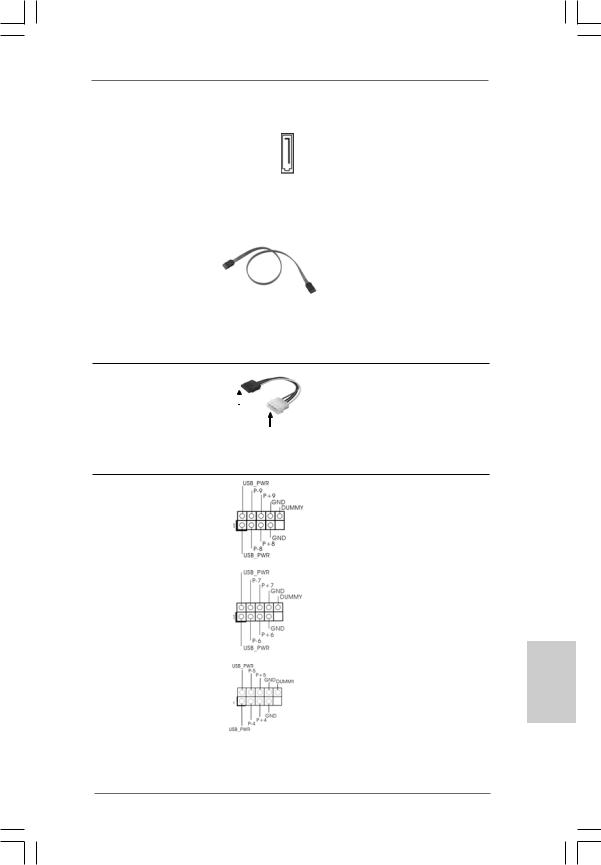
eSATAII Connector |
This eSATAII connector |
(eSATAII: see p.2, No. 36) |
supports SATA data cable for |
|
external SATAII function. The |
|
current eSATAII interface |
eSATAII |
allows up to 3.0 Gb/s data |
|
transfer rate. |
|
|
Serial ATA (SATA) |
Either end of the SATA data cable |
Data Cable |
can be connected to the SATA / |
(Optional) |
SATAII hard disk or the SATAII |
|
connector on this motherboard. |
|
You can also use the SATA data |
|
cable to connect SATAII_6 (Port5) |
|
connector and eSATAII |
|
connector. |
Serial ATA (SATA)
Power Cable |
|
|
|
|
|
(Optional) |
|
|
connect to the SATA |
||
|
HDD power connector |
|
connect to the power supply
Please connect the black end of SATA power cable to the power connector on each drive. Then connect the white end of SATA power cable to the power connector of the power supply.
USB 2.0 Headers |
Besides four default USB 2.0 |
(9-pin USB8_9) |
ports on the I/O panel, there are |
(see p.2 No. 20) |
three USB 2.0 headers on this |
|
motherboard. Each USB 2.0 |
|
header can support two USB |
|
2.0 ports. |
(9-pin USB6_7) |
|
(see p.2 No. 28) |
|
(9-pin USB4_5)
(see p.2 No. 19)
2 3
English
ASRock 4Core1600Twins-P35 Motherboard
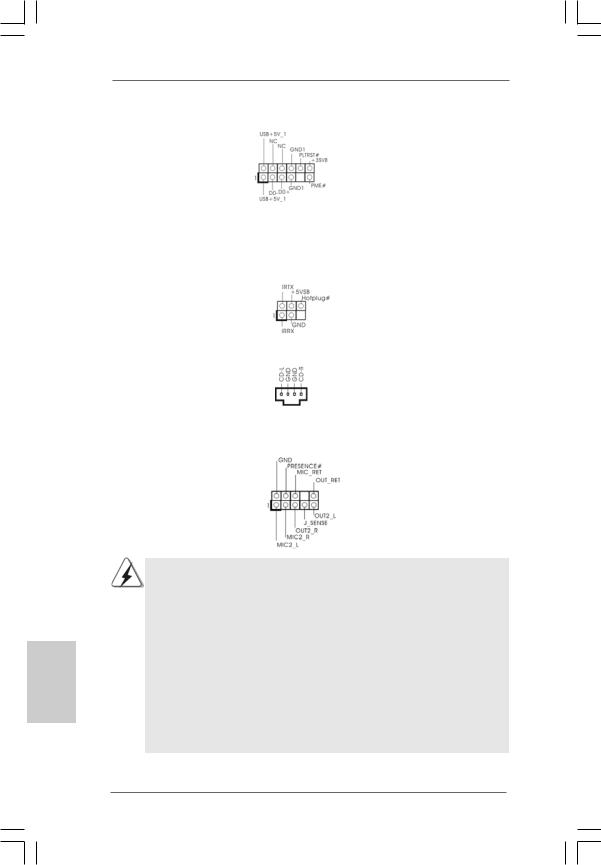
WiFi Header |
|
This header supports WiFi+AP |
(11-pin WIFI) |
|
function with ASRock |
(see p.2 No. 23) |
|
WiFi-802.11g or WiFi-802.11n |
|
|
module, an easy-to-use wireless |
|
|
local area network (WLAN) |
|
|
adapter. It allows you to create a |
|
|
wirelessenvironmentandenjoythe |
|
|
convenience of wireless network |
|
|
connectivity. |
|
|
|
DeskExpress Hot Plug Detection |
|
This header supports the Hot |
Header |
|
Plug detection function for |
(5-pin IR1) |
|
ASRock DeskExpress. |
(see p.2 No. 24) |
|
|
|
|
|
Internal Audio Connectors |
|
This connector allows you |
(4-pin CD1) |
|
to receive stereo audio input |
(CD1: see p.2 No. 28) |
CD1 |
from sound sources such as |
|
|
a CD-ROM, DVD-ROM, TV |
|
|
tuner card, or MPEG card. |
|
|
|
Front Panel Audio Header |
|
This is an interface for front |
(9-pin HD_AUDIO1) |
|
panel audio cable that allows |
(see p.2 No. 27) |
|
convenient connection and |
|
|
control of audio devices. |
hsilgnE
2 4
1.High Definition Audio supports Jack Sensing, but the panel wire on the chassis must support HDA to function correctly. Please follow the instruction in our manual and chassis manual to install your system.
2.If you use AC’97 audio panel, please install it to the front panel audio header as below:
A.Connect Mic_IN (MIC) to MIC2_L.
B.Connect Audio_R (RIN) to OUT2_R and Audio_L (LIN) to OUT2_L.
C.Connect Ground (GND) to Ground (GND).
D.MIC_RET and OUT_RET are for HD audio panel only. You don’t need to connect them for AC’97 audio panel.
E.Enter BIOS Setup Utility. Enter Advanced Settings, and then select Chipset Configuration. Set the Front Panel Control option from
[Auto] to [Enabled].
ASRock 4Core1600Twins-P35 Motherboard
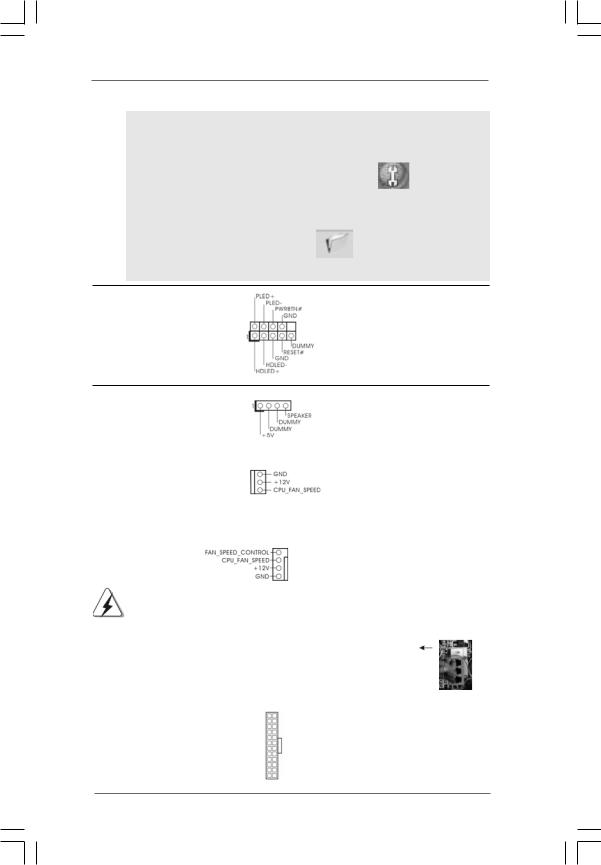
F.Enter Windows system. Click the icon on the lower right hand taskbar to enter Realtek HD Audio Manager.
For Windows® 2000 / XP / XP 64-bit OS:
Click “Audio I/O”, select “Connector Settings” , choose
“Disable front panel jack detection”, and save the change by
clicking “OK”. |
|
For Windows® VistaTM / VistaTM 64-bit OS: |
|
Click the right-top “Folder” icon |
, choose “Disable front |
panel jack detection”, and save the change by clicking “OK”.
System Panel Header
(9-pin PANEL1)
(see p.2 No. 15)
Chassis Speaker Header |
|
Please connect the chassis |
(4-pin SPEAKER 1) |
|
speaker to this header. |
(see p.2 No. 14) |
|
|
|
|
|
Chassis Fan Connector |
|
Please connect a chassis fan |
(3-pin CHA_FAN1) |
|
cable to this connector and |
(see p.2 No. 13) |
|
match the black wire to the |
|
|
ground pin. |
|
|
|
CPU Fan Connector |
|
Please connect a CPU fan cable |
(4-pin CPU_FAN1) |
4 |
to this connector and match |
|
3 |
the black wire to the ground pin. |
(see p.2 No. 3) |
2 |
|
|
1 |
|
|
|
|
|
|
|
|
|
|
|
|
3-Pin Fan Installation |
|
English |
|
|
|
|
|
|
|
|
|
|
|
|
|
|
ATX Power Connector |
12 |
24 |
Please connect an ATX power |
|
||
(24-pin ATXPWR1) |
|
|
supply to this connector. |
|
||
(see p.2, No. 35) |
|
|
|
|
|
|
|
|
1 |
13 |
|
|
|
2 5
ASRock 4Core1600Twins-P35 Motherboard
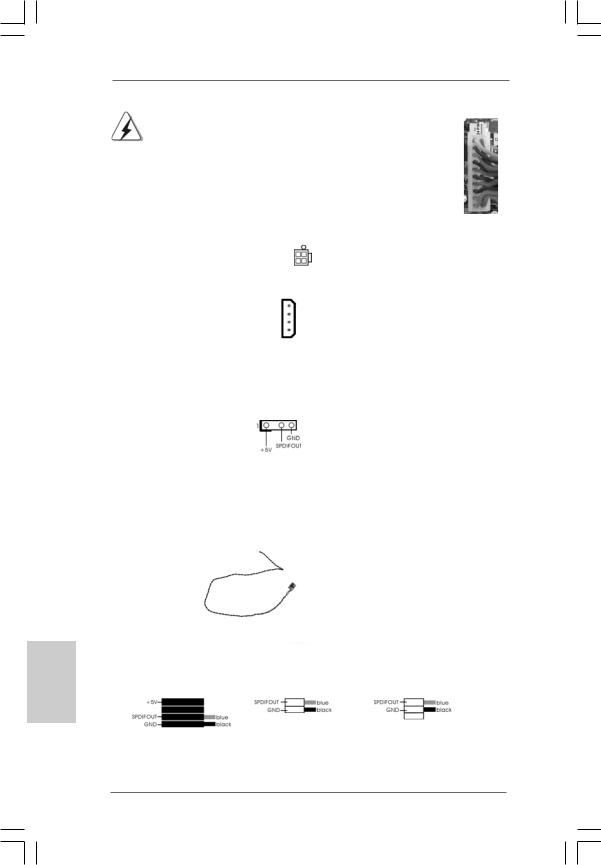
hsilgnE
|
Though this motherboard provides 24-pin ATX power connector, 12 |
24 |
|||
|
it can still work if you adopt a traditional 20-pin ATX power supply. |
|
|
||
|
To use the 20-pin ATX power supply, please plug your |
|
|
||
|
power supply along with Pin 1 and Pin 13. |
|
|
|
|
|
|
20-Pin ATX Power Supply Installation |
1 |
13 |
|
|
|
|
|
||
|
|
|
|
|
|
|
|
|
|
||
ATX 12V Power Connector |
|
Please connect an ATX 12V |
|
||
(4-pin ATX12V1) |
|
power supply to this connector. |
|||
(see p.2 No. 2) |
|
|
|
|
|
|
|
|
|
||
SLI/XFIRE Power Connector |
|
It is not necessary to use this |
|
||
(4-pin SLI/XFIRE_POWER1) |
|
connector, but please connect it |
|||
(see p.2 No. 34) |
|
with a hard disk power connecor |
|||
|
|
SLI/XFIRE_POWER1 |
when two graphics cards are |
|
|
|
|
plugged to this motherboard at |
|
||
|
|
|
|
||
|
|
|
the same time. |
|
|
|
|
|
|||
HDMI_SPDIF Header |
|
HDMI_SPDIF header, providing |
|||
(3-pin HDMI_SPDIF1) |
|
SPDIF audio output to HDMI VGA |
|||
(see p.2 No. 26) |
|
card, allows the system to |
|
||
|
|
|
con nect HDMI Digital TV/ |
|
|
|
|
|
projector/LCD devices. Please |
||
|
|
|
connect the HDMI_SPDIF |
|
|
|
|
|
connector of HDMI VGA card to |
||
|
|
|
this header. |
|
|
|
|
|
|
||
HDMI_SPDIF Cable |
|
Please connect the black end (A) |
|||
(Optional) |
C |
of HDMI_SPDIF cable to the |
|
||
|
|
B |
HDMI_SPDIF header on the |
|
|
|
|
|
|
||
|
|
A |
motherboard. Then connect the |
||
|
|
|
|||
|
|
|
white end (B or C) of |
|
|
|
|
|
HDMI_SPDIF cable to the |
|
|
|
|
|
HDMI_SPDIF connector of HDMI |
||
|
|
|
VGA card. |
|
|
A. black end |
B. white end (2-pin) |
C. white end (3-pin) |
|
||
2 6
ASRock 4Core1600Twins-P35 Motherboard
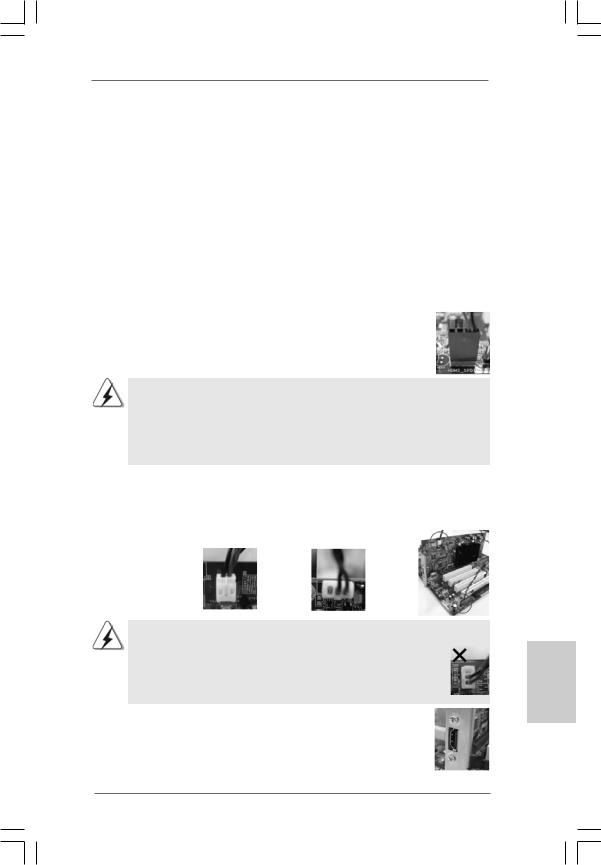
12 24
ion
1 13
2.9 HDMI_SPDIF Header Connection Guide
HDMI (High-Definition Multi-media Interface) is an all-digital audio/video specification, which provides an interface between any compatible digital audio/video source, such as a set-top box, DVD player, A/V receiver and a compatible digital audio or video monitor, such as a digital television (DTV). A complete HDMI system requires a HDMI VGA card and a HDMI ready motherboard with a HDMI_SPDIF header. This motherboard is equipped with a HDMI_SPDIF header, which provides SPDIF audio output to HDMI VGA card, allows the system to connect HDMI Digital TV/projector/ LCD devices. To use HDMI function on this motherboard, please carefully follow the below steps.
•
Step 1.
Step 2.
Step 3.
white end |
white end |
(2-pin) (B) |
(3-pin) (C) |
Please do not connect the white end of HDMI_SPDIF cable to the wrong connector of HDMI VGA card or other VGA card. Otherwise, the motherboard and the
VGA card may be damaged. For example, this picture shows the wrong
example of connecting HDMI_SPDIF cable to the fan connector of PCI English Express VGA card. Please refer to the VGA card user manual for
connector usage in advance.
Step 4. Connect the HDMI output connector on HDMI VGA card to HDMI device, such as HDTV. Please refer to the user manual of HDTV and HDMI VGA card vendor for detailed connection procedures.
Step 5. Install HDMI VGA card driver to your system.
2 7
ASRock 4Core1600Twins-P35 Motherboard

2.10 eSATAII Interface Introduction
What is eSATAII?
This motherboard supports eSATAII interface, the external SATAII specification. eSATAII allows you to enjoy the SATAII function provided by the I/O of your computer, offering the high speed data transfer rate up to 3.0Gb/s, and the convenient mobility like USB. eSATAII is equipped with Hot Plug capability that enables you to exchange drives easily. For example, with eSATAII interface, you may simply plug your eSATAII hard disk to the eSATAII ports instead of opening your chassis to exchange your SATAII hard disk. Currently, on the market, the data transfer rate of USB 2.0 is up to 480Mb/s, and for IEEE 1394 is up to 400Mb/s. However, eSATAII provides the data transfer rate up to 3000Mb/s, which is much higher than USB 2.0 and IEEE 1394, and still keeps the convenience of Hot Plug feature. Therefore, on the basis of the advantageous transfer speed and the facilitating mobile capability, in the near future, eSATAII will replace USB 2.0 and IEEE 1394 to be a trend for external interface.
NOTE:
1.If you set “Configure SATAII as” option in BIOS setup to AHCI mode, Hot Plug function is supported with eSATAII devices. Therefore, you can insert or
remove your eSATAII devices to the eSATAII ports while the system is power-on and in working condition.
2.If you set “Configure SATAII as” option in BIOS setup to IDE mode, Hot Plug function is not supported with eSATAII devices. If you still want to use eSATAII function in IDE mode, please insert or remove your eSATAII devices to the eSATAII ports only when the system is power-off.
3.Please refer to page 33 to 35 for detailed information of IDE mode and AHCI mode.
How to install eSATAII?
hsilgnE
2 8
SATAII connector SATAII_6 (Port5)
eSATAII connector (eSATAII)
ASRock 4Core1600Twins-P35 Motherboard
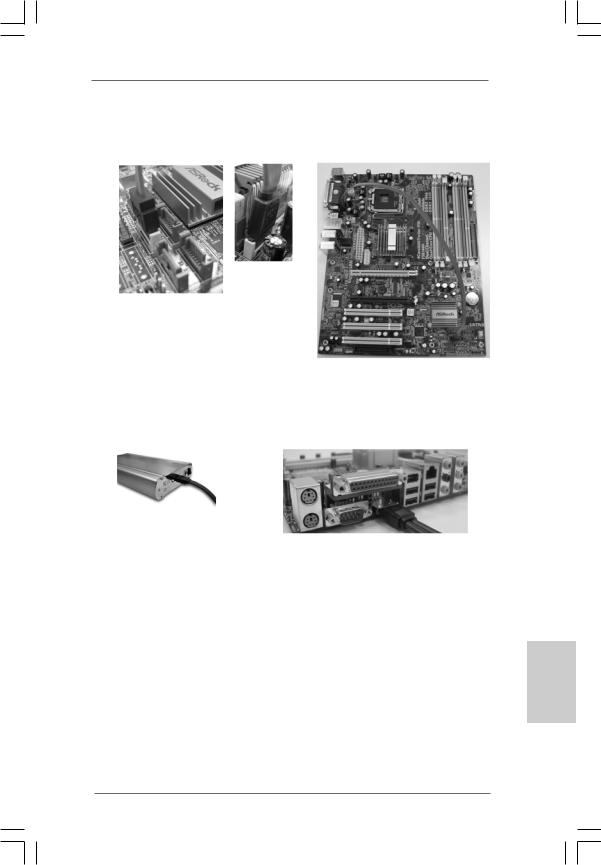
1.In order to enable the eSATAII port of the I/O shield, you need to connect the orange SATAII connector (SATAII_6 (Port5); see p.2 No.17) and the eSATAII connector (eSATAII; see p.2 No.36) with a SATA data cable first.
|
Connect the SATA |
|
|
data cable to the |
|
Connect the SATA data |
eSATAII connector |
|
(eSATAII) |
||
cable to the orange |
||
|
||
SATAII connector |
|
|
(SATAII_6 (Port5)) |
|
2.Use the eSATAII device cable to connect eSATAII device and the eSATAII port of the I/O shield.
Connect one end of the eSATAII
device cable to eSATAII device |
Connect the other end of the eSATAII |
|
device cable to eSATAII port of the I/O |
||
|
||
|
shield |
English
2 9
ASRock 4Core1600Twins-P35 Motherboard

Comparison between eSATAII and other devices
IEEE 1394 |
400Mb/s |
|
USB 2.0 |
480Mb/s |
|
SATA |
1.5Gb/s (1500Mb/s) |
|
|
|
|
eSATAII/SATAII |
3.0Gb/s (3000Mb/s) |
|
|
|
|
hsilgnE
3 0
ASRock 4Core1600Twins-P35 Motherboard
